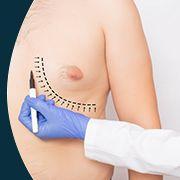How to Prepare for Male Breast Removal Surgery
In This Article
How to Prepare for Male Breast Removal Surgery
Parvathy
Updated on October 08, 2024
Medically verified by Dr. Arya
Fact checked by Dr. Fazeela

Cosmetic
6 min read
Breast removal surgery in men, also known as mastectomy, is usually performed to tackle male breast cancer or gynecomastia, a condition where men develop enlarged breast tissue.
Even though this process may be intimidating, with adequate preparation the surgical procedure can be made more smoother, both physically and emotionally.
Whether you're navigating through this path due to health concerns or aesthetic reasons, this guide by Mykare Health offers a step-by-step approach to help you feel more confident and prepared.
Step 1: Have a proper understanding of procedure
Before the actual surgical procedure ensure that you have done a good background study about the procedure and understand the various type of procedure being performed. Depending on the diagnosis, there are different kinds of mastectomies
-
Simple Mastectomy: Involves the removal of breast tissue and sometimes the nipple but does not affect the chest muscles.
-
Modified Radical Mastectomy: This procedure removes the breast tissue and nearby lymph nodes, typically used in cases of breast cancer to prevent the spread of cancer cells.
-
Subcutaneous Mastectomy: For gynecomastia, the surgeon removes the breast tissue but leaves the nipple and areola intact to give the chest a more natural appearance post-surgery.
Understanding what your surgery entails will help you set realistic expectations and ask any questions before proceeding.
Step 2: Consulting with Your Medical Team
Your surgeon, oncologist (if dealing with cancer), and general physician are your main points of contact. It’s essential to engage with them and fully comprehend every detail of the surgery, recovery, and potential outcomes.
-
Ask Questions: Inquire about the duration of the surgery, the type of anesthesia used, and how much tissue will be removed. For cancer patients, ask if you will need radiation or chemotherapy post-surgery.
-
Discuss Risks: Every surgery comes with risks. Some common concerns include infection, scarring, or reaction to anesthesia. Your doctor will outline the risks and how to mitigate them.
-
Clarify Recovery Expectations: Find out what to expect during recovery. For some, recovery may take a few weeks, while others may take longer, depending on the extent of the surgery.
Second Opinion: If you feel unsure, don’t hesitate to seek a second opinion, especially if the surgery involves removal of cancerous tissue.
Step 3: Pre-Surgery Health and Lifestyle Changes
Your body will need to be in optimal health to recover quickly post-surgery. Here are a few changes to consider
-
Quit Smoking and Alcohol: Smoking can interfere with healing and increase the risk of complications such as infections. Similarly, excessive alcohol consumption can impair your immune system. Doctors typically recommend quitting smoking at least 4-6 weeks before surgery.
-
Adopt a Balanced Diet: Nutrition plays a pivotal role in healing. Increase your intake of protein-rich foods, leafy greens, and fruits to boost your immune system. Your body will thank you post-surgery.
-
Exercise: Gentle exercises such as walking or light cardio can improve your stamina and help your body heal faster after surgery. Strengthening your body pre-surgery will help your recovery time.
-
Sleep and Rest: Make sleep a priority in the weeks leading up to surgery. Your body heals when it rests, and entering surgery well-rested can make a significant difference.
 9 min read
9 min readThe Advantages of Choosing Mykare Health for Gynecomastia Surgery
 6 min read
6 min readIdentifying The Ideal Age For Gynecomastia Surgery
 6 min read
6 min readPre and Post Gynecomastia Surgery: Essential Things to Know
Get a Callback Now
Step 4: Mental and Emotional Preparation
Preparing mentally and emotionally is as vital as the physical aspect. Undergoing male breast removal surgery can stir feelings of anxiety, fear, or even loss. Men, particularly, might struggle with societal expectations or concerns about body image post-surgery.
-
Counseling or Therapy: Speaking to a therapist who specializes in medical or cancer-related issues can provide an outlet to process your feelings.
-
Support Groups: Connecting with men who have undergone the same surgery can offer insight, reassurance, and a sense of community. Knowing you’re not alone in your experience can be incredibly comforting.
-
Open Conversations with Loved Ones: Sharing your concerns with family members or close friends allows them to provide emotional support. Be honest about your fears and how they can assist during your recovery process.
-
Visualize Recovery: Use mindfulness or meditation techniques to imagine a successful recovery. Visualizing yourself healed, strong, and resilient can help reduce pre-surgery anxiety.
Step 5: Logistical Planning for the Day of Surgery
Practical planning will help the actual surgery day go smoothly. Here are key things to consider
-
Arrange Transportation: Since anesthesia will be used, you won’t be able to drive yourself home. Arrange for a trusted friend or family member to pick you up after surgery and stay with you for the first 24-48 hours post-operation.
-
Prepare Your Home: Make your home recovery-friendly. Set up a comfortable resting area with easy access to water, medications, and other essentials. Stock up on healthy, easy-to-prepare meals or snacks. You might not feel like cooking post-surgery, so having everything prepared beforehand can reduce stress.
-
Pack a Hospital Bag: Pack a small hospital bag with essentials like loose-fitting clothes, toiletries, medications, and any necessary paperwork. Button-down shirts or zip-up jackets are preferable, as they’re easier to wear post-surgery.
-
Plan for Post-Surgery Care: Ensure that someone is available to help you in the days following your surgery. Even simple tasks like bathing or dressing may require assistance.
Step 6: Post-Surgery Care and Recovery
Recovery after male breast removal surgery is a gradual process. Here are the key stages
-
Pain Management: Some pain and discomfort are normal after surgery. Your doctor will prescribe pain medications or recommend over-the-counter options. Follow the recommended dosage strictly to avoid complications.
-
Wound Care: You will have bandages and possibly drains (for fluid buildup) placed near the surgical site. Your doctor will give you specific instructions on how to care for your wounds to prevent infection.
-
Movement and Activity: Rest is crucial in the first few days post-surgery, but it’s also important to gently move your body. Your doctor will recommend light movements, such as walking, to promote circulation. Avoid strenuous activities and heavy lifting until you’re fully cleared by your doctor.
-
Monitoring Your Recovery: Keep an eye on your recovery progress. If you notice signs of infection (redness, swelling, fever) or experience severe pain, contact your healthcare provider immediately.
-
Follow-Up Appointments: Attend all follow-up appointments with your surgeon. They will monitor your healing process, remove any drains, and assess whether further treatments (such as radiation or chemotherapy) are necessary for cancer patients.
Understanding the type of surgery, risks, and recovery expectations can significantly reduce pre-surgery anxiety and set you up for success.
Prepare your body by quitting smoking, adopting a balanced diet, staying active, and getting enough rest. A healthy body heals faster.
Emotional preparation is just as important as physical preparation. Seek support through therapy, support groups, or conversations with loved ones.
Arranging transportation, preparing your home, and packing a hospital bag can help ease the practical stresses of surgery day.
Follow your doctor's instructions on wound care, pain management, and activity restrictions for a smooth recovery.
Don’t rush the healing process. Attend follow-up appointments, monitor your recovery, and gradually ease back into your normal activities.
Source Links
Dr Vivek Kumar
American Society of Plastic Surgeons
Centre for surgery



